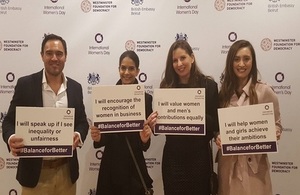#BalanceforBetter: Celebrating achievements of Lebanese women
In celebration of International Women’s Day under this year’s #BalanceforBetter theme, British Ambassador Chris Rampling hosted a reception at his residence in recognition of our continued support to women across various fields and programmes.

International Women's Day #BalanceforBetter
The event was attended by British Minister for Middle East and International Development Alistair Burt, Minister of State for Youth and Women Violette Safadi in addition to women and men across all disciplines of life.
The reception comes at an important time for Lebanon and the Lebanese as they welcomed their new government with the highest representation of women in the history of Lebanon. With five women ministers, including the first female interior minister in the Middle East, a balance for better approach is making progress. It also comes at a time to recognise the many gender inequalities that still exist today, and talk about what we can do to create a fairer, more balanced world.
In his address, Ambassador Rampling thanked the Westminster Foundation for Democracy who are doing significant work with the Lebanese parliament and the region reinforcing bilateral relations.
Ambassador Rampling said:
I am pleased to see many of you wearing the symbolic purple colour of this year’s International Women’s Day theme. International Women’s Day is not a celebration of the struggles of women in the economic, social, political, and cultural domain - it is a celebration of the achievements of what women have done and will continue to do, to further the calls for Balance for Better in every aspect of daily life.
No society can reach its full potential when half the population is not able to participate fully in public life. What we mean by that today is of course, women in government and parliament.
Throughout history, women have shaped the human experience and transformed our world culturally, socially and politically. There is no better way to make change and seek balance than now. Women and girls want a lasting change: to end violence, to allow access to education, to support political participation and much more. This includes protecting and empowering girls and women in conflict, protracted crises and humanitarian emergencies, leaving no girl or woman behind.
Women participation makes peace agreements stronger, societies more resilient and economies more vigorous. That’s why the empowerment of women and girls is at the heart of the UN’s 2030 Agenda for sustainable development. And that’s why the UK’s strong leadership on gender equality, the #LeaveNoGirlBehind girls’ education campaign was prominent in 2018, with Preventing Sexual Violence in Conflict Initiative remaining a key priority this year.
UK support to women and girls in Lebanon has been significant across most of our projects be it in education, supporting Lebanese women MPs, our work with Women in Front, with the National Council for Lebanese Women, with the LAF and ISF who recruited female officers, with Caritas for a better implementation of law to protect women, with ABAAD to end violence against women and girls and more’.
Dina Melhem, Regional Director Asia and MENA at Westminster Foundation for Democracy (WFD) commended the work that WFD has been doing with Lebanese parliamentarians over the years and more specifically with women MPs, hoping that Lebanon sees more women participation and reaching higher positions in political and social life.